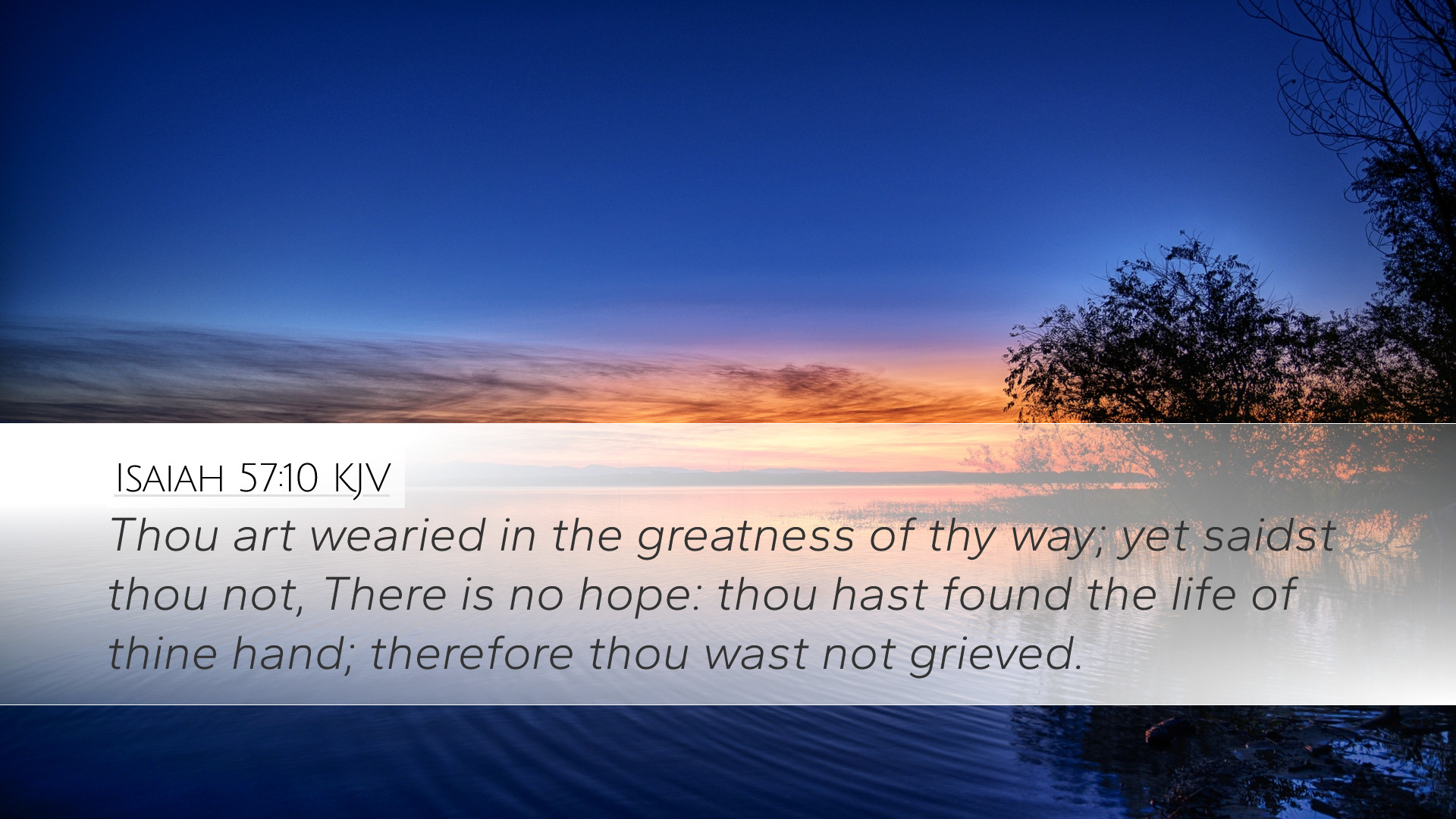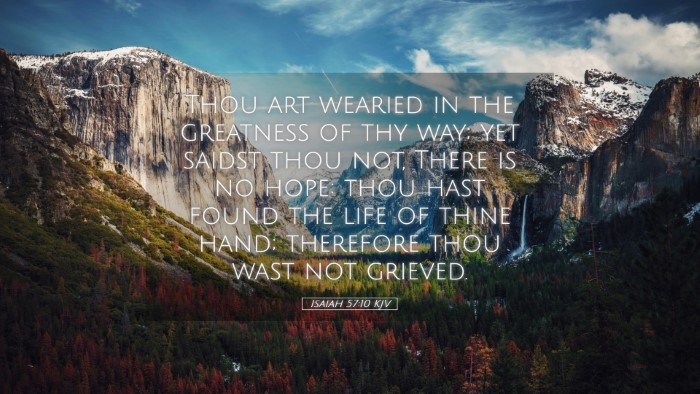Commentary on Isaiah 57:10
Verse: "Thou art wearied in the greatness of thy way; yet saidst thou not, There is no hope: thou hast found the life of thine hand; therefore thou wast not grieved."
Introduction
Isaiah 57:10 presents a penetrating insight into the state of Israel, characterized by weariness through their reckless pursuits and an obstinate heart that refuses to acknowledge their dire condition. The prophetic message delivered by Isaiah serves as both an indictment of Israel's spiritual apathy and a call to recognition of their need for restoration.
Context of the Passage
The broader context of Isaiah 57 discusses themes of judgment and hope. During a time of significant spiritual decline, the people of Israel sought after false comforts and pursuits that ultimately led them away from God. Isaiah’s prophetic voice urges them to reflect on their ways and return to sincere worship and reliance on Yahweh.
Insights from Public Domain Commentaries
Matthew Henry's Commentary
According to Matthew Henry, this verse highlights the futility of Israel's efforts in seeking satisfaction apart from God.
-
Weariness in Pursuits: Henry describes how the people wearied themselves in their relentless quest for worldly pleasures and security, which was a manifestation of their spiritual exhaustion.
-
False Sense of Hope: The statement “yet saidst thou not, There is no hope” is indicative of a deep-seated denial among the people. They refused to acknowledge their hopelessness, clinging instead to a misguided belief that their worldly pursuits could yield lasting fulfillment.
-
Life of their Hand: This phrase reflects the misguided reliance on their own efforts, which Henry points out, ultimately leads to despair rather than true satisfaction. Their labors, in seeking independence from God, are in vain.
Albert Barnes' Notes on the Bible
Albert Barnes emphasizes the relationship between weariness and the human condition. His analysis suggests:
-
Recognition of the Struggle: Barnes draws attention to the idea that weariness is a common theme in human experience. This weariness stems from trying to achieve contentment through secular means rather than divine reliance.
-
The Nature of False Comforts: He highlights that instead of repenting and seeking God, the Israelites found comfort in their own abilities and lifestyles, which ultimately proved to be temporary and unfulfilling.
-
The Contrast of True Hope: Barnes explains that the true hope lies in God’s grace, which the people were blind to, preferring instead to continue in their futile efforts.
Adam Clarke's Commentary
Adam Clarke provides a deeply theological perspective, shedding light on the implications of the verse:
-
The Weight of Weariness: Clarke notes that the phrase "wearied in the greatness of thy way" encapsulates the burdensome energy expended in pursuing paths that do not lead to life. This depiction serves to remind believers of the emptiness of such pursuits.
-
Self-Deception: Clarke underscores the danger of self-deception prevalent in the hearts of the Israelites. They were so engrossed in their ways that they failed to perceive their own need for correction, illustrating a spiritual blindness that can afflict any believer.
-
God's Call for Repentance: Clarke urges readers to understand that God’s message through Isaiah is a call to repentance—a plea not to remain in spiritual lethargy but to awaken to the wonders of divine mercy.
Theological Implications
Understanding Isaiah 57:10 provides profound theological implications for the contemporary church:
-
Human Exhaustion and Divine Rest: In a world that continually demands more, the burden of self-sufficiency can lead to exhaustion. The call, as highlighted in this verse, invites us to relinquish our striving and enter into the rest that God provides through faith in Christ.
-
Awareness of Spiritual Blindness: The refusal to admit despair and the obfuscation of one's true condition are pertinent challenges today. Congregations must foster environments where individuals are encouraged to confront their spiritual realities honestly.
-
Hope Found in God Alone: This passage emphasizes that genuine hope is not found in human agency but in God's redemptive work. It is essential for pastors and leaders to guide their communities toward reliance on Christ, who is the source of hope and life.
Conclusion
Isaiah 57:10 serves as a timeless reminder of the dangers of spiritual weariness and self-reliance. The insights drawn from public domain commentaries illuminate the necessity of returning to God and recognizing Him as the source of true life and hope. For pastors, students, theologians, and scholars, this verse encapsulates critical themes of repentance, the futility of worldly pursuits, and the joy of finding rest in God's promises.


